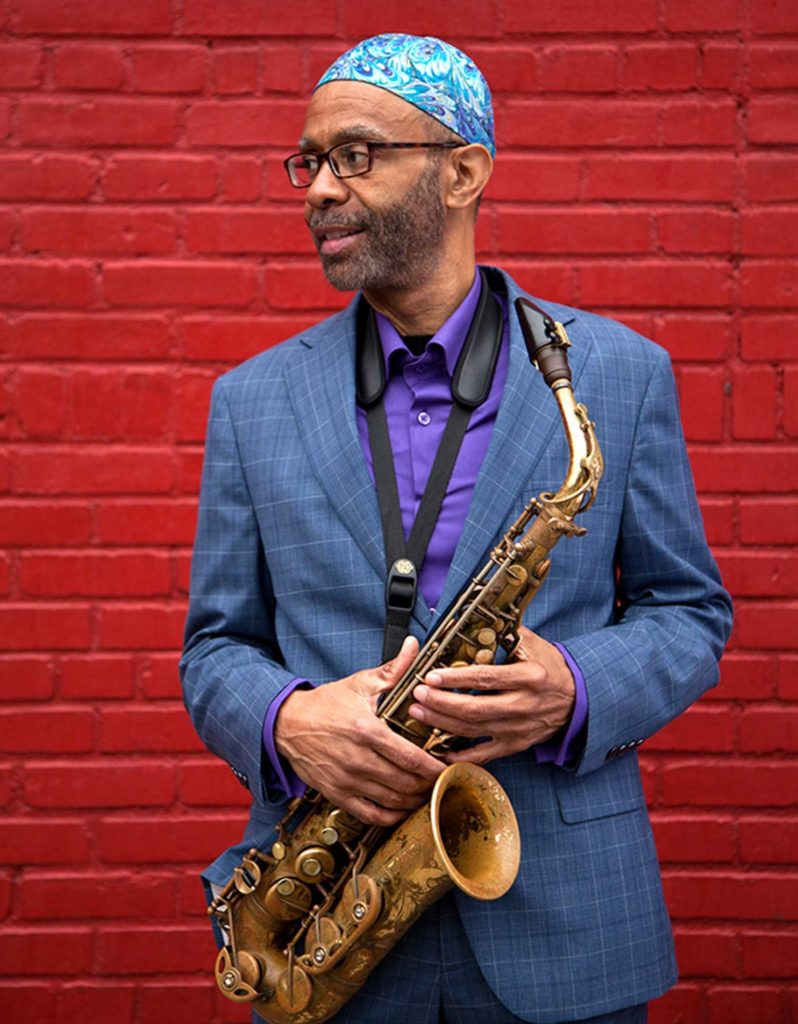
Saxophonist and Grammy Award-winner Kenny Garrett released his album “Sounds from the Ancestors” on August 27 and is back on the road to showcase its songs along with his earlier compositions. He performs at Scullers Jazz Club on October 1 and 2, the venue’s first live shows since the start of the pandemic. In addition to Garrett’s group — Vernell Brown Jr. on piano, Corcoran Holt on bass, Ronald Bruner Jr. on drums and Rudy Bird on percussion — the album includes vocalists Dwight Trible, who has worked with Pharoah Sanders, Linny Smith, a choir director at The Greater Allen AME Cathedral of New York, Chris Ashley Anthony and Sheherazade Holman.
Garrett’s compositions here and on numerous albums carry the sounds of urban, Cuban and African traditions. The music is melodic, and while easy to listen to once, has enough depth so that hearing it again and again and again, listeners can experience new and surprising aural sensations. With a career that includes stints with Art Blakey, Miles Davis, Chick Corea and Christian McBride, among others, Garrett’s time as his own bandleader yields lasting originality. The Banner caught up with Garrett by phone from his home in New Jersey.
Banner: Tell us about a few of the songs on your new album.
Kenny Garrett: “It’s Time to Come Home” is a melody. I thought of my grandchild when writing it, as in, you’re outside playing, and it’s time to come in. “When the Days Were Different,” is about when I was a child growing up in Detroit. There was always a BBQ or family gathering happening. And people would tell stories: aunts, uncles, cousins. I wanted to capture that feeling. “For Art’s Sake,” is a tribute to the great drummer Art Blakey, as well as to drummer Tony Allen. In the song “Sounds from the Ancestors,” everything is there: plantations and the sounds we heard from churches, mosques and synagogues as children. The record itself came about when I thought about how, when I was a kid, I’d take out all my 45s at the end of the year and fill up my heart and soul with the music. I wanted to try and catch a snippet of that.
What about the pandemic contributed to the album’s creation?
I started to record it pre-pandemic, in 2019, and like a lot of people, I knew that this sound was just there. My experiences playing with Chucho Valdés, the Cuban pianist and composer, contributed to the work. As a composer and artist, I listen from a distance, and it all keeps circling.
I know that you’ve spoken about the influences of Marvin Gaye and Aretha Franklin in the album. Say more.
I’m always turning to those individuals. That’s the soundtrack of my life. Like Marvin Gaye’s “What’s Going On.” That was the state of music we heard growing up. I’m always striving for that level of consciousness in my music. To one day maybe get to the point of creating a record on that level. Always striving.
You also talk about the influence of gospel in your music.
It’s where I come from. I reflect on my mom. My father was also a deacon. I still feel connected to my parents’ music, like Mahalia Jackson and James Cleveland, among others. Those sounds are always in my music somehow. Maybe not overblown, but there. The feeling of being connected to a higher purpose.
You’re out performing after a hiatus — recently at the Blue Note in New York and soon in Boston. Have audiences changed?
I was in the south of France, for the first time in over a year, and it wasn’t the same. And we played the Detroit jazz festival last weekend. I try to envision the audience. To inject emotion into the performance. Things are moving, moving slowly. It’s another learning experience.
I think that the pandemic changed all of us, of course. How has it changed you?
It made me more cognizant of what’s most important: grandkids, my daughter, family. I was fortunate enough not to have to worry about a lot of things. Making sure that my family was safe. Learning and relearning people. It was a blessing to be able to stop and think. To study, and to practice. The main thing was being with my family. I have always wanted to motivate people with my music. I lost a lot of friends during the pandemic, too, and we made it, and I feel that we are here for a reason — until it’s our turn. One thing I tell younger musicians is, it’s a discipline; learn how to sit with yourself.






